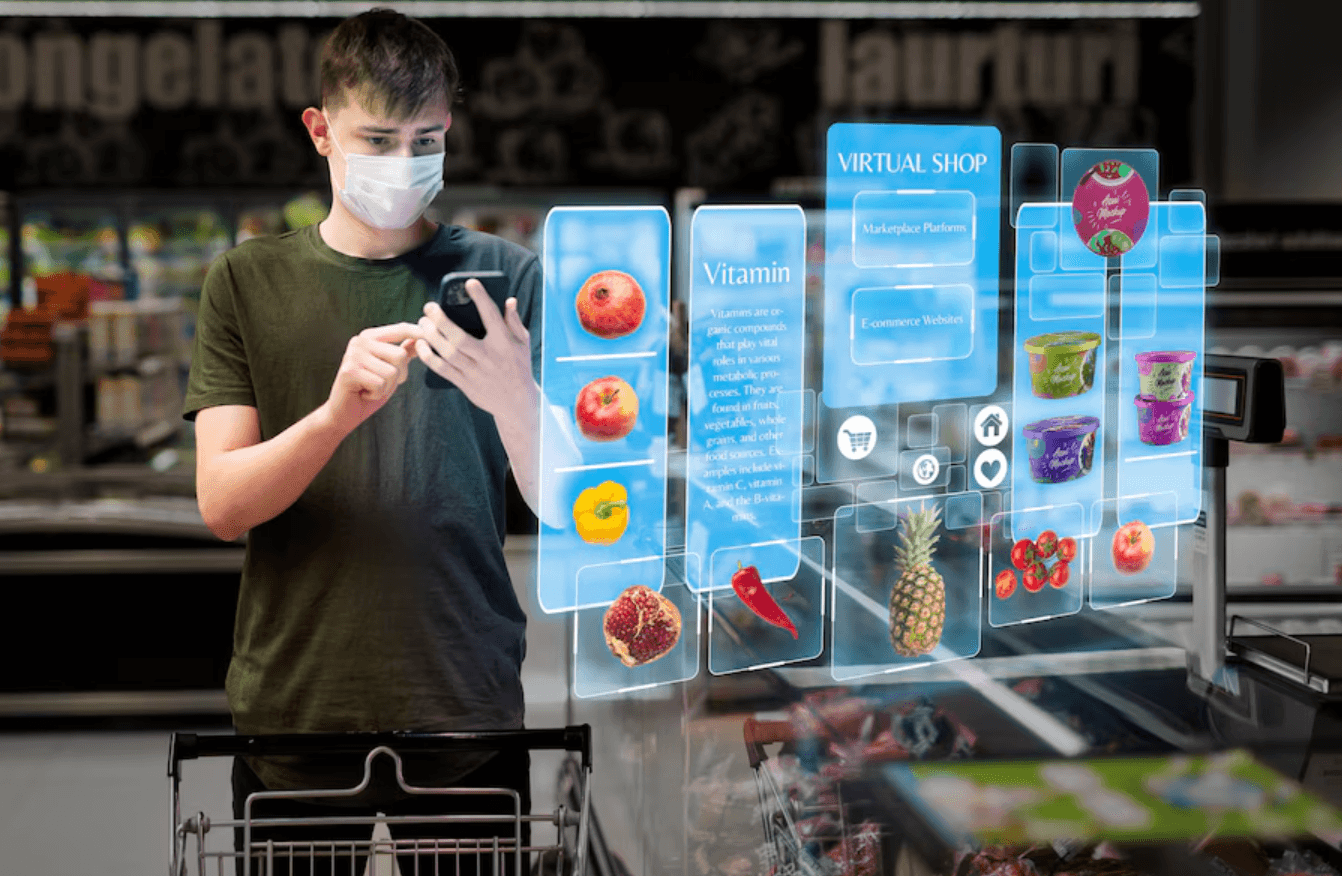
The world of retail is vastly distinct from the way it was 10 years earlier. Registers, electronic bags with self-checkout machines, and the cashless option are replacing shopping carts.
But, as we transition into the age of technology and AI, another change is taking place within the retail sector. The advancement of generative AI and large-language models (LLMs) are transforming how retailers communicate with their clients, monitor sales, oversee their operations, and market their goods.
One of the most well-known examples of this change is the numerous retail AI firms that leverage AI’s capabilities to enhance the shopping experience as well as provide cutting-edge solutions and services to the retail industry.
What are AI Retail Solutions?
Artificial Intelligence has shown its remarkable abilities across the globe in a variety of diverse ways. Presently, AI is providing benefits to retailers with its unique solutions. One of the most efficient ways to develop software that integrates with AI could be called AI retail solutions for the industry. With the help of AI via predictive analytics retailers can make an informed choice on price, buy enough stock, and enhance product placement. Consumers will be able quickly and efficiently locate products they need at the appropriate places when they need them.
Top 10 AI Retail Solutions Transforming the Industry
The number of AI strategies used in retail is increasing rapidly. Certain are relatively brand new, such as visually-based recognition. Other techniques, like AI-based applications are known and growing each day.
Personalization
Today’s consumers demand more than just products and services; they are looking for experiences that are tailored to their individual preferences. AI examines the patterns of complex data in huge databases, like the history of purchases, browsing patterns, and use of social media for recommendations that are personalized as well as advertisements.
This level of precision permits retailers to design customized email messages, to recommend products that are relevant as well as personalize the user’s interface.
In the future, we could soon see AI anticipating the needs of customers before the customers realize they need these needs. Based on, for instance, previous purchases and internet shopping habits, merchants could recommend the right winter clothing to someone who is expected to travel to an area with a lower temperature soon. In addition, by analyzing the preferences of a consumer’s food and preferences for health, AI can personalize the shopping cart and suggest healthy options.
AI also assists in providing personalized shopping experiences for customers by leveraging their understanding of the environment that reflects consumer preferences and tendencies.
Autonomous Stores: AI-Driven Retail Automation
Though it could seem futuristic, the concept of an autonomous retail store is in the process of forming. By utilizing a vast system of sensors, cameras, and machine-learning software, items are automatically scanned, and charged after customers have left to leave, enhancing customer satisfaction as well as operational efficiency.
Beyond convenience, the technology could transform the experience of customers in retail stores. Retailers equipped with AI cameras will be able to assess the emotions of shoppers as they look at the merchandise and display and give them immediate deals that pull them into their character. As the technology improves the stores will have the ability to change the layout of shelves, monitor them, and replenish them by permitting the movement of goods in the store, by using robots.
Blockchain in Retail Supply Chain
The combination of blockchain and AI provides an unparalleled degree of transparency and efficiency. From soil-quality information to the production date for a shirt, each step of the production process is recorded in a permanent ledger.
This is beneficial to retailers because it will mean fewer fake and illegal products. It also ensures consumers that the item is authentic. Consider scanning the QR code on the item on your phone and tracking the entire route. Furthermore, AI retail software development can predict supply interruptions to the chain or increases in demand. Furthermore, blockchain technology will ensure that every entity within the chain meets its obligations and can ensure smooth operations.
In addition, blockchain smart contracts will instantly pay suppliers once AI-powered sensors in the warehouses of retailers verify that the goods were delivered and have been inspected for quality.
Augmented Reality Shopping
Augmented Reality is set to change the way we shop on the internet. Through AR glasses and smartphones, customers can put on outfits or put furniture inside their bedrooms. AI assists in the experience by recommending items according to personal tastes as well as previous purchases, current fashions, and their context.
Additionally, it allows consumers to customize their items including furniture by the color and the space of the living space. This will not only improve the experience of shopping online, but, it can help decrease the return rate. This is a major issue faced by many merchants.
Imagine that people who make use of AR and AI develop an internet-based shopping assistance that offers real-time suggestions on items as well as answers to questions and even provides assistance in stores. Imagine a chatbot that asks you questions regarding the best hiking boots. It’ll respond by asking about your experiences in the past and spending budget before analyzing the dimensions of your feet with AR. This will give you the ideal options.
Chatbots
The chatbots of the future powered by AI are an incredible leap from their predecessors that were based on the rules. They can comprehend the context of interactions, respond to complex questions, and acquire insights by interacting with users. Retailers can benefit from this, which translates into lower operating costs as well as 24-hour customer support. Chatbots are also able to assist in understanding the context of customers and collect relevant information to aid retail personnel by resolving an opportunity that was missed.
Soon, chatbots might become virtual assistants for shopping. They will guide shoppers on every shopping trip, offering individualized advice similar to the help in the store provided by employees. Furthermore, the latest AI chatbots are able to detect shoppers’ moods by analyzing text inputs and adjusting their responses according to the consumer’s mood. This will result in a better user experience.
AI-Driven Demand and Inventory Management
The scenarios of overstock and out-of-stock could be costly for retailers. AI by using predictive analytics, can predict the market’s conditions with precision.
By analyzing historical sales data, local event information, and forecasts of weather as well as global information, AI can provide actionable facts. That means efficient warehouses, efficient supply chains, fewer the amount of waste caused by perishables that are running out, and increased profit. Through the integration of AI together with IoT (Internet of Things) the ability to track inventory in real-time can be achieved and can lead to dynamic pricing strategies as well as adjustment of promotions.
Robots and drones powered by AI can manage warehouse activities including replenishing shelves, as well as packing and picking up orders. AI systems can change the supply chain process based on conditions. As an example, if the conditions suddenly alter a supply route in the supply chain, the AI will instantly shift the delivery or change how inventory is distributed between several areas.
Additionally, AI solutions for retail and ecommerce can assist business users in designing supply chains using a range of approaches, like the efficiency of costs, minimal lead times, etc.
Integration of IoT and Tech
The Internet of Things, comprising smart shelves, interactive displays as well as other devices that are connected provide a vast amount of information that’s continuously updated. AI algorithms will analyze the information and offer insights into customer preference in terms of inventory levels, customer preferences, as well as patterns of navigating at stores.
The range of personalized advice for smart fitting rooms, automated checkouts, and the capability to anticipate the maintenance of equipment in stores The integration between AI as well as IoT has already brought about more efficiency for operations as well as better customer care.
When a store is connected where the buyer is spending a long time on one aisle, the display will instantly show sales or other data, helping customers in their decision-making. Based on sensors that measure the shelves’ weight at the location and the weight of shelves, you can immediately reorder inventory or alter pricing on shelves with ESLs (electronic shelf labels) for helping to move stock.
In addition, AI can enable insights about how perishable items are treated in the supply chain through studying the data that is collected by the logistics provider including temperature and humidity, as well as the routes and more.
Facial Recognition: Retail Security and Privacy
Artificial Intelligence-driven facial recognition is rapidly increasing in popularity with retailers all over the world. It gives a wide range of choices, from increased security through identifying possible shoplifters and restricting access to restricted areas within stores or warehouses, face-based transactions, and the capability to determine the date of purchase for items that are restricted.
Displays that are interactive in retail stores such as those in stores, could offer personalized content, for example, by making it easy to identify customers’ preferences. Digital signage and billboards out of stores may also feature targeted advertisements based on the characteristics of the customer thus increasing the efficacy of ads.
Recognition of faces also offers improved customer service. For example, by being able to recognize frequent customers and employees at the stores, they are in a position to offer customers personalized assistance and discounts.
Smart Carbon Tracking
Sustainability has become a major goal for businesses as well as consumers. With increasing awareness of the environment retail stores are being encouraged by their customers to prove their commitment to sustainable practices. The integration of AI into their operations it will allow them to go beyond the tracking of only a few items to more efficient carbon management.
AI helps retailers monitor their carbon footprint throughout their supply chain. From the sourcing of raw materials until the delivery of products, AI will analyze and provide insight into the areas with high carbon-intensive activities and suggest methods to decrease the carbon footprint.
Apart from the basic features, AI can analyze weather roads, conditions on the road, as well as patterns of traffic to gauge the amount of carbon-intensive a service or product.
In addition, the will also allow for generative AI is expected to significantly decrease the amount of time needed to integrate data from multiple systems to give reports.
In addition, AI can analyze historical data to forecast carbon emissions that are generated through planned actions. This can aid businesses in predicting the necessity to adopt strategies for reducing carbon emissions. Furthermore, AI can be used to decrease energy usage at stores, and warehouses, as well as during transportation. By anticipating the demand for energy use, AI will also help decrease waste and contribute to sustainable development.
AI in Fashion: Data-Driven Insights
Fashion is constantly changing. Trends change fast. AI helps fashion stores stay ahead of fashion trends. AI will be able to anticipate future fashion trends by analyzing massive quantities of data gathered via the Internet and social media networks. It can also predict search results on the internet, as well as the patterns of sales. The result is a change in the creation and production processes and helps reduce waste as designers create products that are most likely to become well-known. Designers and retail stores can work together to decrease the amount of time required to bring products into the marketplace.
AI will provide suggestions on the fit and size of mirrors or suggest alternative items. Smart mirrors can profit from this technology to improve customer satisfaction in retail shops. Through integrating data from wearables using an AI-powered system stores could suggest products that correspond for a person’s needs and interests.
Additionally using artificial intelligence-powered try-ons into the application for mobile, stores will be able to let customers take online tests of cosmetics and other fashion items and provide personalized recommendations according to facial features such as skin tone and many other variables.
Conclusion
The future of retail is right now here, and AI for e-commerce is the driving force behind the future of retail. If retail businesses want to stay relevant in a rapidly evolving market, then taking on AI strategies to improve the performance of their retail industry isn’t required, however, it’s a should. Retailers that successfully incorporate AI technology within their operations can meet the ever-changing demands of clients, improve efficiency, and create growth opportunities.
How do you get started with this new AI-driven revolution? It’s crucial to work in conjunction with professionals who are acquainted with the world of retail and the intricacies of AI technology. Companies like A3Logics are experts in providing customized AI solutions for retailers that are of any size.








